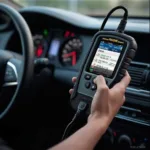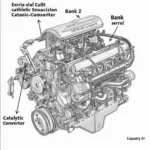An OBD2 engine misfire code is a common issue that can lead to various drivability problems and decreased fuel efficiency. Diagnosing and resolving this issue quickly is vital for maintaining your vehicle’s performance and preventing further damage. This article will guide you through everything you need to know about OBD2 engine misfire codes, their causes, symptoms, and solutions.
Diagnosing an OBD2 engine misfire code is the first step in fixing the problem. obd2 code 301 is a specific example of a misfire code, indicating a misfire in cylinder 1. Understanding these specific codes can help pinpoint the issue more accurately.
What are OBD2 Engine Misfire Codes?
OBD2 engine misfire codes signify that one or more cylinders in your engine are not firing correctly. When a cylinder misfires, the air-fuel mixture fails to ignite or combusts incompletely, resulting in reduced power output and potentially harmful emissions. The OBD2 system detects this malfunction and generates specific codes to indicate the problematic cylinder(s).
Common Causes of OBD2 Engine Misfire Codes
Several factors can contribute to engine misfires. Here are some of the most common causes:
- Faulty Spark Plugs: Worn or fouled spark plugs can prevent the ignition of the air-fuel mixture, leading to a misfire.
- Bad Ignition Coils: Ignition coils provide the high voltage needed to fire the spark plugs. A failing coil can cause intermittent or complete misfires.
- Vacuum Leaks: Leaks in the intake manifold or vacuum hoses can disrupt the air-fuel ratio, leading to incomplete combustion.
- Fuel Injector Problems: Clogged or malfunctioning fuel injectors can disrupt the fuel delivery to the cylinders, resulting in a misfire.
- Low Compression: Low compression in a cylinder can be caused by worn piston rings, valves, or head gasket leaks. This can prevent proper combustion.
- Sensor Issues: Faulty sensors, such as the crankshaft position sensor or camshaft position sensor, can disrupt the engine timing and lead to misfires.
Symptoms of an OBD2 Engine Misfire
Recognizing the symptoms of an OBD2 engine misfire can help you identify the problem early on. Common symptoms include:
- Check Engine Light: The illumination of the check engine light is often the first indication of a problem. You can use an obd2 ford expedition scanner or a similar device to retrieve the specific code.
- Rough Idle: A misfiring engine can cause a rough or uneven idle, making the car vibrate excessively while stationary.
- Loss of Power: Misfires can result in a noticeable decrease in engine power and acceleration.
- Reduced Fuel Economy: A misfiring engine burns fuel less efficiently, leading to a decrease in fuel mileage.
- Hesitation or Stuttering: The engine may hesitate or stutter during acceleration.
How to Diagnose OBD2 Engine Misfire Codes
Diagnosing an OBD2 engine misfire code requires a systematic approach. Here’s a step-by-step guide:
- Retrieve the Code: Use an OBD2 scanner, like a ford obd2 bluetooth device, to retrieve the specific misfire code.
- Identify the Cylinder: The code will often indicate the specific cylinder(s) experiencing the misfire, such as P0301 (Cylinder 1 Misfire).
- Inspect Spark Plugs and Wires: Check the spark plugs for wear, fouling, or damage. Also, inspect the spark plug wires for cracks or damage.
- Test Ignition Coils: Use a multimeter or a dedicated coil tester to check the resistance of the ignition coils.
- Check for Vacuum Leaks: Inspect the intake manifold and vacuum hoses for any leaks.
- Test Fuel Injectors: Use a fuel pressure gauge and a noid light to test the fuel injectors for proper operation.
“Regular maintenance, including spark plug and ignition coil replacements, can significantly reduce the occurrence of OBD2 engine misfire codes.” – John Smith, Automotive Engineer.
Fixing OBD2 Engine Misfire Codes
The solution to an OBD2 engine misfire code depends on the underlying cause. Common fixes include:
- Replacing Spark Plugs: Worn or fouled spark plugs should be replaced.
- Replacing Ignition Coils: Faulty ignition coils should be replaced.
- Repairing Vacuum Leaks: Repair or replace any leaking vacuum hoses or intake manifold gaskets.
- Cleaning or Replacing Fuel Injectors: Clogged fuel injectors can sometimes be cleaned, but severely malfunctioning injectors should be replaced.
An obd2 scanner code p0303 points to a misfire in cylinder 3. Resolving this specific code may involve addressing issues with that cylinder’s spark plug, ignition coil, or fuel injector.
 Fixing an Engine Misfire
Fixing an Engine Misfire
Conclusion
OBD2 engine misfire codes can be a nuisance, but understanding their causes, symptoms, and solutions empowers you to address them effectively. Regular maintenance and timely repairs can prevent misfires and ensure your engine runs smoothly and efficiently. Addressing an obd2 engine misfire code promptly can save you money on repairs and improve your vehicle’s performance.
FAQ
-
What does an OBD2 engine misfire code mean?
It indicates that one or more cylinders are not firing properly. -
What causes an OBD2 engine misfire code?
Common causes include faulty spark plugs, bad ignition coils, vacuum leaks, and fuel injector problems. -
How can I fix an OBD2 engine misfire code?
The fix depends on the cause. It might involve replacing spark plugs, ignition coils, fixing vacuum leaks, or cleaning/replacing fuel injectors. -
What are the symptoms of an engine misfire?
Symptoms include a rough idle, loss of power, reduced fuel economy, and hesitation/stuttering during acceleration. -
How do I diagnose an OBD2 engine misfire code?
Use an OBD2 scanner to retrieve the code, identify the affected cylinder, and inspect related components. -
Can I drive with an engine misfire?
It’s best to address the issue promptly, as continued driving can worsen the problem and damage the engine. -
How often should I replace my spark plugs?
Refer to your vehicle’s owner’s manual for the recommended spark plug replacement interval.
We’re here to help! If you need further assistance, contact us via WhatsApp: +1(641)206-8880 or email: [email protected]. Our 24/7 customer support team is ready to assist you. Also, check out our other helpful resources on obd2 codepo308.

